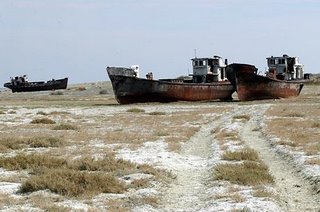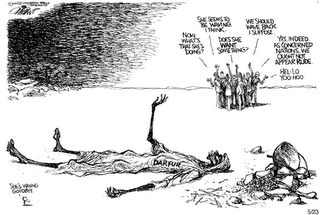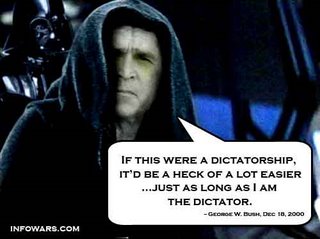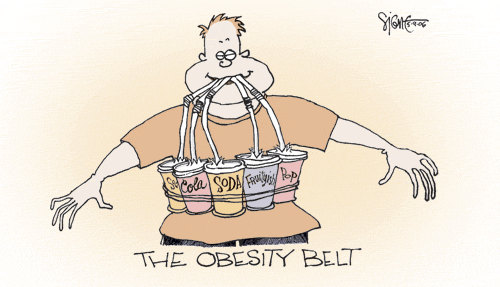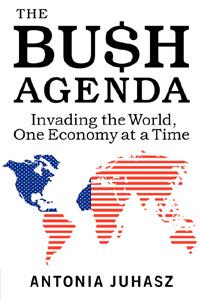
Antonia Juhasz kirjoittaa Bushin hallituksen "vapaakaupasta", joka on itse asiassa amerikkalaista imperialismia kaarittyna vapauden vaippaan. Terrorismin vastaisella sodalla Yhdysvallat pyrkii saamaan koko maailman markkinat vaikutusvaltansa piiriin. Monikansalliset (amerikkalaiset) yhtiot saavat huikeita voittoja, kun WTO:n avulla itsenaisten maiden sisaisia lakeja muutetaan naille yhtioille suosiollisiksi. Paikalliset pienyrittajat, maanvijelijat ja kauppiaat karsivat, silla useimmiten uudet saannot vievat heilta elinkeinon suuryritysten hyvaksi. Paikallinen kulttuuri, vuosisataiset tavat ja tieto katoaa. Usein luonto otetaan suuryritysten hyotykayttoon ottamatta huomioon teollisuuden ekologisia vaikutuksia.
Excerpt: The Bush Agenda
By
Antonia Juhasz,
AlterNet. Posted
May 5, 2006.
[Editor's Note: This is an edited excerpt from Antonia Juhasz's new book,
The Bush Agenda : Invading the World, One Economy at a Time, published by Regan Books.]
An uncharacteristically somber George Walker Bush approached the podium of the Great Hall of the United Nations on Sept. 14, 2005. As the president stood in midtown Manhattan to address the gathered members of the General Assembly, much of the U.S. Gulf Coast lay buried beneath a sea of water, mud, waste, sand and debris. Two days before, the bodies of 45 people had been discovered in a flooded New Orleans hospital, adding to a death toll that already exceeded a thousand. Over one million people were without homes, including tens of thousands just recently released from the New Orleans Convention Center and Superdome, where they were forced to stay for almost a week without food, water or electricity while outdoor temperatures exceeded a sweltering 100 degrees.
This would be President George W. Bush's fifth address before the U.N. General Assembly. Two months after Sept. 11, 2001, he established an annual tradition of addressing the Assembly within days of the anniversary of the terrorist attacks and just miles from ground zero. The president has used each speech to put forward his international agenda squarely within the context of 9/11. It was with these speeches that Bush made the case for war beyond Afghanistan, into Iraq, and against all states that harbor terrorists; he laid out the criteria for those who are "with us" versus those who are "against us" as he built a "coalition of the willing"; and he affirmed his commitment to expanded international trade policies in the name of fighting terrorism and spreading freedom.
The president, visibly tired, spent much of the speech looking down at his notes. His familiar easy swagger, comfortable grin and animated gestures were all but missing. True to form, however, he made no alteration to his message. Bush spent a mere 95 seconds of the 25-minute speech discussing the hurricane. He noted the devastation, thanked the gathered nations for their support and moved on. Then, as he had done every year for the previous four years, the president devoted the bulk of his address to just two topics. The first, not surprisingly, was the war on terror, including the war in Iraq. The second was the expansion of free trade. Once again, Bush offered these two policies, war and free trade, as twin solutions to virtually all of the world's problems -- from global poverty to international health crises, including AIDS, malaria and the Avian flu -- and as the means to achieving a better world.
The president described the benefits of war and his administration's commitment to it by assuring his listeners that "all of us will live in a safer world" if we stay the course in Iraq and complete the war effort. The United States and all "civilized nations" would "continue to take the fight to the terrorists" and "defeat the terrorists on the battlefield." As for free trade, Bush explained that the United States would also defeat the terrorists by fighting poverty and "the surest path to greater wealth is greater trade. … By expanding trade, we spread hope and opportunity to the corners of the world, and we strike a blow against the terrorists. … Our agenda for freer trade is part of our agenda for a freer world."
The agenda has been refined by President Bush and leading members and allies of his administration over decades, dating back most notably to the administration of his father, George Herbert Walker Bush. Its leading framers include men who served in the administrations of both father and son, such as Dick Cheney, Donald Rumsfeld, Paul Wolfowitz, Zalmay Khalilzad, Robert Zoellick and Scooter Libby. Decades of joint writing, refining and advocating for a set of clear economic and military principles reached its fullest articulation and most aggressive implementation under the administration of George W. Bush -- what I call the "Bush Agenda." This agenda predates the current president, however, and its advocates certainly hope it will outlast him.
Within the Bush Agenda, "freer trade for a freer world" refers to specific economic policies designed especially to support key U.S. multinational corporations that are used as veritable weapons of war, both in the war on terror and in the administration's broader struggle to spread its vision of a freer and safer world. Often, these economic policies are applied in tandem with America's military forces, as was the case in the March 2003 invasion and ongoing occupation of Iraq. To date, the Iraq war represents the fullest and most relentless application of the Bush Agenda. The "freer and safer world" envisioned by Bush and his administration is ultimately one of an ever-expanding American empire driven forward by the growing powers of the nation's largest multinational corporations and unrivaled military.
Free trade is shorthand for a number of economic policies that expand the rights of multinational corporations and investors to operate in more locations, under fewer regulations, with less commitment to any specific location. Advocates contend that these companies and individuals, freed of burdensome government regulations, will amass great wealth and become engines of economic growth. Their wealth, in turn, will filter down through the economy, enriching even the very poorest members. One common image offered to depict the benefits of free trade is of a rising tide of wealth lifting all boats in its wake.
The specific free trade policies advanced by the Bush administration are not new. Their modern roots trace to the end of World War II and the founding of the now dominant global financial institutions, the International Monetary Fund and the World Bank. They have been the preferred international economic tools of U.S. presidents for decades, especially over the last 35 years and in response to the growth of the Organization of Petroleum Exporting Countries (OPEC) and its attempts to control the global oil economy. The key difference between Bush and his recent predecessors is that Bush has directly aligned economic might with military force and has applied both with a more radical, unilateral and audacious approach. As a result, the Bush Agenda has generated the greatest level of violent opposition to the United States and its allies in recent history and made the world a far more dangerous place. If the Bush Agenda is allowed to stay its course, the poverty, inequality, hostility and violence it generates will intensify and grow.
Of course, the Bush Agenda does have supporters, especially corporate allies that have both shaped and benefited from the administration's economic and military policies. Many of those allies are found in the energy sector, while many from the energy sector are found in the Bush administration. In the 2000 election cycle, the oil and gas industry donated over 13 times more money to the Bush-Cheney campaign than to its challenger -- nearly $2 million versus just over $140,000. In 2004, the industry gave more than nine times more to Bush-Cheney. The Bush administration itself represents the first time in history that the president, vice president and secretary of state are all former energy company officials. In fact, the only other U.S. president to come from the oil and gas industry was Bush's father.
The Bush years have been a record-breaking bonanza for the oil industry. The twenty-nine major oil and gas firms in the United States earned $43 billion in profits in 2003 and $68 billion in 2004. Oil profits were so high in 2005 that the top three companies alone (ExxonMobil, Chevron and ConocoPhillips) earned nearly $64 billion between them, more than half of which went to Texas-based ExxonMobil, which recorded the single most profitable year of any corporation in world history in both 2004 and 2005. Companies such as Halliburton and Chevron, which respectively count the vice president and secretary of state as former officials, are key allies to the Bush Agenda. The Bechtel Corp., the largest engineering company in the world, with extensive work in the oil and gas field, has exercised influence over the Bush Agenda through its current and past executives, including current board member and former company president, George Shultz, Ronald Reagan's secretary of state. Lockheed Martin, the country's largest military contractor and the world's largest arms exporter, has also played a lead role, with no fewer than 16 current and past company officials having held positions within the Bush administration.
The George W. Bush years have been remarkably rewarding for each of these companies, particularly in the post-Iraq invasion period. Indeed, each company has a long history in Iraq, played a lead through company executives past and present in advocating for war against Iraq in 2003, and has since profited greatly from that war. Chevron had its most profitable year in its 125-year history in 2004, earning $13.3 billion -- nearly double its profits from the year before. The record did not last long, however, as 2005 brought more than $14 billion in profits. Bechtel's revenue increased from $11.6 billion in 2002 to $16.3 billion in 2003 to $17.4 billion in 2004. Halliburton's stock price has nearly quadrupled in value from March 2003 to January 2006, while Lockheed's stocks more than tripled from early 2000 to January 2006. Vice President Cheney is a stockholder in both Halliburton and Lockheed.
The past 25 years of U.S. economic engagement with Iraq, culminating in the 2003 invasion and the ongoing occupation, provide the most glaring example of the Bush Agenda and its imperial ambitions. President Ronald Reagan, and to an even greater extent President George H.W. Bush, focused U.S. economic policy toward Iraq on an increasingly intimate and profitable economic engagement. President George W. Bush has gone further, and in so doing, revealed his imperial aims, by seeking and largely achieving economic control over and within Iraq's economy. The Bush administration used the military invasion of Iraq to oust its leader; replace its government; implement new economic, political and oil laws; and write a new constitution. Through the ongoing U.S. military occupation, the Bush administration seeks to ensure that both the new government and the new economic structure stay firmly in place.
The new economic laws have fundamentally transformed Iraq's economy, applying some of the most radical, sought-after corporate globalization policies in the world and overturning existing laws on trade, public services, banking, taxes, agriculture, investment, foreign ownership, media and oil, among others. The new laws lock in sweeping advantages to U.S. corporations, including greater U.S. access to, and corporate control of, Iraq's oil. And the benefits have already begun to flow. Between 2003 and 2004 alone, the value of U.S. imports of Iraqi oil increased by 86 percent and then increased again in the first three quarters of 2005.
Thus, advocates of the Bush Agenda have succeeded in spreading corporate globalization policy to Iraq -- securing both short- and long-term profits for U.S. corporations -- and establishing an Iraqi government that is more favorable than the last ten years of Saddam Hussein's regime to the continued advancement of the agenda. But Iraq is only the beginning.
With the encouragement of Bechtel, Chevron, Halliburton, Lockheed Martin and others, the Bush administration has begun to expand its agenda to countries across the Middle East with the U.S.-Middle East Free Trade Area. Insulated by oil revenues, the countries of the Middle East have been largely immune from the need to sign free trade agreements. With the invasion and occupation of Iraq, however, the Bush administration has demonstrated the lengths to which it will go to fulfill its interests. Worried about "regime change" spreading to their countries, an unprecedented number of Middle Eastern governments are participating in these free trade negotiations, which are progressing rapidly.
President Bush reaffirmed his commitment to expanding free trade policy in his 2005 U.N. address. Much of the speech was in fact devoted to the World Trade Organization (WTO) ministerial meeting in Hong Kong three months later. The president argued "the lives and futures of millions of the world's poorest citizens hang in the balance -- and so we must bring the [WTO] trade talks to a successful conclusion." Founded in 1995, the WTO has 148 member governments and is the most powerful global institution writing and enforcing the rules of corporate globalization. Headquartered in Geneva, Switzerland, the WTO administers agreements on issues as broad and far-reaching as agriculture, telecommunications, government procurement and services on behalf of its members. It provides a forum for expanding these agreements and negotiating new ones. The WTO monitors the internal laws of its members, arbitrates disputes between governments over its rules and enforces its rulings through the imposition of sanctions. Every two years, the WTO holds ministerial level meetings at which high-ranking government officials finalize negotiations on existing and newly proposed WTO rules.
Before the WTO, multinational trade rules dealt largely with the movement of goods between countries, primarily tariffs, which are taxes applied to goods as they enter or exit a country, and quotas, which dictate the amount of a specific product that can enter or leave a country. While the WTO continued to regulate these aspects of trade, it went further, moving inside of countries and regulating their internal laws. Every law or government policy that has the potential, whether intended or not, to impact foreign companies or investors is open to WTO regulation.
Fighting terror with trade
On Sept. 20, 2001, U.S. Trade Representative Robert Zoellick announced that the Bush administration would be "countering terror with trade." In a Washington Post Op-Ed, Zoellick argued that "free trade" and "freedom" are inextricably interlinked and that trade "promotes the values at the heart of this protected struggle." In the name of fighting terror, he called for the passage of a series of corporate globalization agreements -- including negotiations to expand the WTO and Fast Track authority -- which had already been the topic of serious Congressional debate and conflict.
"Fast Track" refers to legislation that allows the president to move trade bills through Congress quickly by overriding core aspects of the democratic process such as committee deliberations, full congressional debate and the ability to offer amendments. The administration had tried unsuccessfully to pass such legislation for over a year. Now, however, a new opportunity presented itself -- 9/11. Literally wrapping the administration in the flag, Zoellick declared that "Congress, working with the Bush administration, has an opportunity to shape history by raising the flag of American economic leadership. The terrorists deliberately chose the World Trade towers as their target. While their blow toppled the towers, it cannot and will not shake the foundation of world trade and freedom."
Congress and the public decried Zoellick's opportunism. One memorable condemnation came from New York Rep. Charlie Rangel. A senior member of the Democratic Party, a leader of the 1960s civil rights movement and the ranking member on the Committee on Ways and Means, Rangel has an imposing physique and a raspy voice that gives the impression that he spent the last 24 hours yelling at someone. He also has a quiet charm that is at least as disarming as his physical presence. He raised a powerful voice against Zoellick when he said that "to appeal to patriotism in an effort to force Congress to move on Fast Track by claiming it is needed to fight terrorism would be laughable if it weren't so serious." Unfortunately, Zoellick was not alone in his position: It was administration policy.
Four months later, President Bush delivered what was arguably one of the most important State of the Union Addresses in 50 years -- the first after 9/11. In the speech, the president repeated Zoellick's characterization of 9/11 as an opportunity to spread free trade and free markets. He, too, called on Congress to pass his corporate globalization agenda in the spirit of recovery from 9/11. In the closing moments of his speech, the president explained that "in this moment of opportunity, a common danger is erasing old rivalries. … In every region, free markets and free trade and free societies are proving their power to lift lives. Together with friends and allies from Europe to Asia and Africa to Latin America, we will demonstrate that the forces of terror cannot stop the momentum of freedom."
The mantra, soon to be repeated in speech after speech by President Bush and his subordinates in the buildup to war was that his administration would be "trading in freedom." "Free trade" and "free markets" were synonymous with "freedom," and the United States was willing to implement this theory with military force. It was pure imperialism, which the advocates of the Bush Agenda had been waiting for decades to implement.
Antonia Juhasz is a
Foreign Policy In Focus scholar who is based in San Francisco and working on a book about the economic invasion of Iraq. She is currently on tour with The Bush Agenda and you can view her schedule on her web site,
TheBushAgenda.org.


